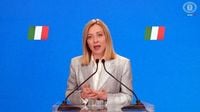On Thursday, April 17, 2025, Italian Prime Minister Giorgia Meloni met with U.S. President Donald Trump at the White House, marking a significant moment in transatlantic relations. This meeting came on the heels of a tumultuous period in international trade, characterized by chaos surrounding tariffs that have impacted markets globally.
Meloni’s visit is particularly noteworthy as it makes her the first European leader to engage with Trump after the recent escalation of tariffs, which have raised concerns across the European Union. The summit, set to begin shortly after 6 PM Italian time, represents a complex diplomatic challenge for Meloni, who has been tasked with navigating the intricate web of trade relations between Italy, the U.S., and the EU.
In January 2025, Meloni had a brief encounter with Trump at Mar-a-Lago, Florida, where they discussed the case of journalist Cecilia Sala, who was imprisoned in Tehran and later released. Since then, the landscape of international relations has shifted dramatically, with Trump introducing tariffs on foreign goods, creating confusion in global markets.
As Meloni arrived in Washington, she was keenly aware of the stakes involved. The ongoing trade war has resulted in significant stock market losses, and the Republican administration's apparent disinterest in supporting Ukraine has raised alarms within the EU. In response, the European Union has accelerated its Readiness 2030 rearmament plan, which includes a proposed budget of 800 billion euros.
During her visit, Meloni is expected to present several proposals aimed at easing tensions with Washington, particularly concerning trade. One of her key objectives is to increase Italian investments in the U.S., leveraging major companies such as Eni and Leonardo. These investments are intended to create jobs on American soil and strengthen bilateral ties.
Moreover, Meloni aims to enhance Italy's purchase of liquefied natural gas from the U.S., which aligns with Trump's desire to balance trade flows. This commitment is also part of Italy's broader strategy to diversify its energy sources, especially in light of reduced imports from Russia.
Another critical point on the agenda is defense spending. Italy is working toward meeting NATO's requirement of allocating 2% of its GDP to defense, a goal that is now within reach. This commitment is seen as a positive step in solidifying Italy's role as a reliable ally within the NATO framework.
However, the meeting also carries the weight of broader geopolitical implications. Trump has imposed tariffs of up to 145% on Chinese goods, aiming to weaken China's economic position. Meloni's discussions will likely touch on the need for Europe to remain united in its approach to China, as Trump expressed concerns about any potential rapprochement between Italy and Beijing.
As Meloni prepares for the closed-door meeting, she is also armed with insights from a phone call with Ursula von der Leyen, the President of the European Commission, which took place just before her departure to the U.S. This conversation was pivotal in coordinating EU positions regarding trade negotiations with the Trump administration.
Meloni's strategic role as a potential mediator between Washington and Brussels is underscored by her proposal to facilitate a direct meeting between Trump and von der Leyen. This initiative aims to mend transatlantic relations that have been strained by trade disputes and differing foreign policy priorities.
In addition to trade and defense, the agenda includes discussions about the ongoing conflict in Ukraine. Meloni is expected to propose a new military protection system for Kyiv, responding to U.S. calls for increased European involvement in the conflict. This move could enhance Italy's standing as a diplomatic bridge between the U.S. and the EU.
Despite her proactive approach, Meloni's mission has not been without criticism. Several European leaders, including those from France, have expressed concerns that Italy might prioritize its national interests at the expense of a unified EU stance. This apprehension underscores the delicate balance Meloni must maintain as she navigates her diplomatic efforts.
Adding complexity to the situation is the relationship between Meloni and prominent figures in the U.S., such as Elon Musk. Reports indicate that Musk is beginning to distance himself from Meloni due to her willingness to engage with opposition figures regarding space communications. This development could complicate Meloni's efforts to leverage personal connections for diplomatic gain.
As the meeting unfolds, all eyes will be on Meloni and Trump, particularly given the backdrop of economic uncertainty and geopolitical tension. The outcome of their discussions could have far-reaching implications not only for Italy and the U.S. but for the entire European Union.
In anticipation of the meeting, Trump took to Truth Social, stating, "I had a very productive talk with the president of Mexico yesterday. And I met with Japanese trade representatives; it was a productive meeting. All countries, including China, want to meet with us. Today, it's Italy." This statement highlights the significance of Italy's role in the broader discussions on tariffs and trade negotiations.
The bilateral meeting, which is expected to last about an hour, will be followed by a session with reporters in the Oval Office. However, no joint press conference is scheduled, indicating the sensitive nature of the discussions taking place.
As Meloni and her delegation prepare for their discussions at the Blair House, the outcomes of this pivotal meeting remain uncertain. The stakes are high, and the ramifications of their negotiations will likely resonate across the Atlantic for years to come.







